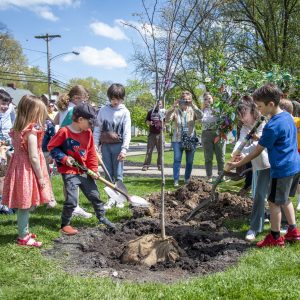get engaged!
Mt. Lebanon’s Community Relations Board (CRB) is tweaking an existing service for future use by focusing on a throwback virtue: sitting down face-to-face and working out a problem.
The board’s community mediation program, which helps resolve neighborhood disputes not clearly governed by ordinance, has been around for years. Recently, board members took a hard look at the process and decided it could be improved.
Mediation offers a common-sense alternative to filing a costly complaint with District Judge Blaise Larotonda. Any resident can request mediation, and, provided the other party agrees to participate, the free process can help them forge a solution to the issue. Possible situations might involve barking dogs, parking disagreements, excessive noise, etc.
Previously, once a request was received and both sides agreed to participate, mediation was scheduled. Both parties met with a mediator from the community relations board, who helped them set ground rules for the discussion and facilitate a resolution, typically a compromise. Though the resolution was not legally binding, residents often found that talking through a problem with an unbiased third party was helpful.
Much of the former mediation structure remains the same, but now, each party to the dispute will have a mediation guide throughout the process with a third board member serving as a neutral mediator. Board members Lisa Borrelli Dorn and Dianne Wainwright, both attorneys, were the prime movers behind the innovation, which they hope will make the process less confrontational and more efficient.
“The purpose is two-fold,” says Wainwright. “One: we want to help people get rid of their anxiety and fear of the process, and two: we want to get rid of the rhetoric and get right to the issue.”
Borrelli Dorn says societal isolation, partly due to modern technology, makes community mediation a valuable alternative. “People don’t know how to relate to each other as well, because we don’t have to do it anymore,” she says. “When you have inflamed emotions, sometimes people just don’t want to deal with it.
Residents can request mediation or if a complaint already has been filed with the magistrate’s office, Judge Larotonda will have the option to temporarily postpone the court date and refer parties to mediation.
Both parties in the dispute must agree to mediate and must fill out a mediation request form, which can be obtained online or at the customer service center in the municipal building, 710 Washington Road. Name and contact information for both parties are all that is needed. Drop off or mail the completed form to the attention of Susan Morgans, Staff Liaison, Community Relations Board.
Once the form is received, mediation will be scheduled, usually within 30 days. Prior to the mediation, each participant will be assigned a mediation guide who helps them prepare to present their case. “We’re going to help them define their position, weeding out the emotion,” Borrelli Dorn says.
Both parties will attend the mediation, along with their guides and a mediator, who will have no knowledge of the dispute beforehand. (The Community Relations Board chair will usually serve as mediator.) Participants will sign a Consent to Mediate. Each guide will share their participant’s side of the dispute or, if the residents prefer, lend assistance as they present their sides.
All participants, including the mediator and guides, will then work toward a mutually acceptable resolution. If both sides agree, the mediator will draw up a Mediation Agreement, outlining the mutual expectations, and the participants will then sign the form. If agreement can’t be reached, participants can opt to file a complaint, or continue to work toward resolution on their own.
Judge Larotonda echoes Borrelli Dorn’s concern that civil conversation and consensus building is something of a lost art. “In court, I’ll say to (parties), ‘Did you guys talk?’ The answer is usually, ‘No.’ They’ll show me texts,” he says. “Instead of relying on me to make a decision, I’d like them to work together to come up with their own solution.”
For more information on Mt. Lebanon’s community mediations, call 412-343-3780. All information is confidential.






